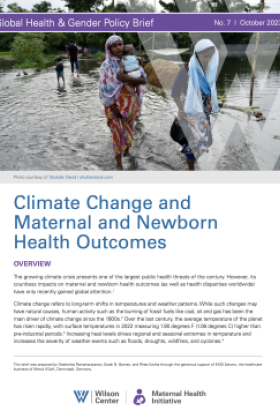Global Health & Gender Policy Brief: Climate Change and Maternal Newborn Health Outcomes


The growing climate crisis presents one of the largest public health threats of the century. However, its countless impacts on maternal and newborn health outcomes (as well as health disparities worldwide) have only recently gained global attention.
While climate change affects all aspects of life in all areas of the world, existing inequities exacerbate the stress felt by its impacts across underserved groups. Women and girls often face increased risks and strains from the impacts of climate change due to existing gender roles and cultural norms that make them responsible for household energy, water, food, and caregiving. There is strong evidence that climate change impacts affect pregnancy and newborn health directly, as well as indirectly due to structural or infrastructure changes where pregnant people and their newborns live.
In a new policy brief, Climate Change and Maternal and Newborn Health Outcomes, the Wilson Center’s Maternal Health Initiative explores the direct and indirect impacts of climate change on maternal and newborn health outcomes; highlights existing policies working to prevent or mitigate these impacts; and offers recommendations to improve resiliency to the growing impacts of the climate crisis.
Authors

Maternal Health Initiative
Housed within the Wilson Center's Environmental Change and Security Program, the Maternal Health Initiative (MHI) leads the Wilson Center’s work on maternal health, global health equity, and gender equality. Read more

Explore More
Browse Insights & Analysis
Closing the Women’s Health Gap: Research, Investment, and Eliminating Inequities

2024 Dot-Mom Guest Contributor Highlights



